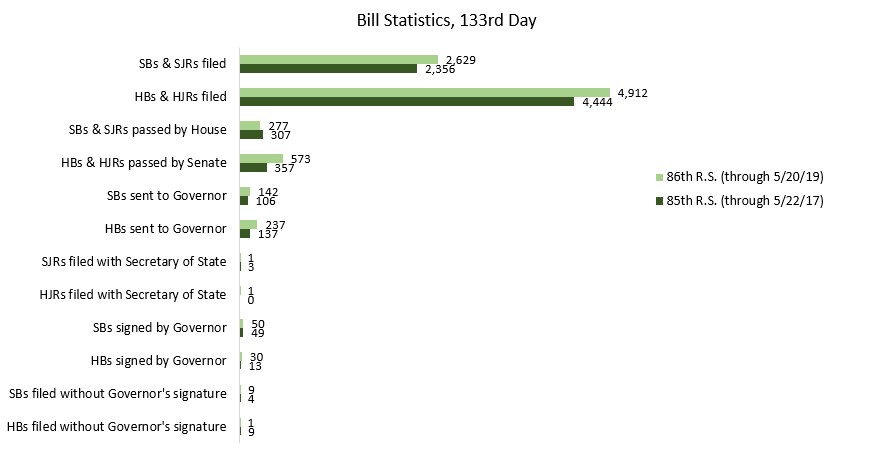- Presentation to the Transition Legislative Oversight Committee, Texas Health and Human Services Commission, September 12, 2018
- Progress Report on Transformation of the Health and Human Services System, Texas Health and Human Services Commission, July 2018
- Health and Human Services Transformation (Transition plan, timeline, Sunset process, and presentations), Texas Health and Human Services Commission
- "San Antonio and Other Texas Cities Confront the Spillover from the Border Migration Crisis," Texas Tribune, July 3, 2019
- "Governor Abbott To Deploy More Texas National Guard To Address Crisis At Southern Border," Governor Greg Abbott, June 21, 2019
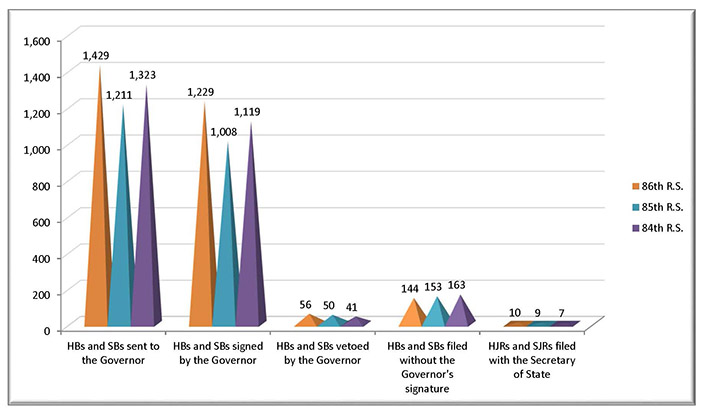
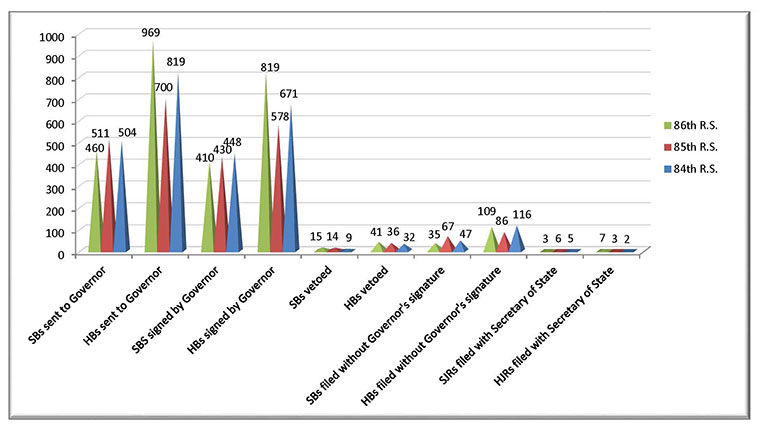
- To see how these statistics have changed since last week, please view our blog post from June 12 and June 10.
- To learn about session law chapter numbers and copies of signed bills, please view our blog post from June 5.
|
House and Senate Bills
|
|
| Filed | 7,324 |
| Sent to the Governor | 1,429 |
| Signed by the Governor | 1,229 |
| Vetoed by the Governor | 56 |
| Filed without the Governor's signature | 144 |
| House and Senate Joint Resolutions | |
| Filed | 217 |
| Filed with the Secretary of State | 10 |
| House and Senate Concurrent Resolutions | |
| Filed | 254 |
| Filed with the Secretary of State | 29 |
| Sent to the Governor | 96 |
| Signed by the Governor | 94 |
| Vetoed by the Governor | 2 |
| Filed without the Governor's signature | 0 |
June 16 is the last day the Governor can sign, veto, or allow to become law without his signature bills presented to him less than 10 days (not counting Sundays) prior to final adjournment of the 86th Regular Session.
The following bill statistics were calculated on June 12 at 1 p.m. The Governor continues to be hard at work reviewing bills, so the signing numbers are growing! To see how these statistics have changed and other post-session information, see previous blog posts on the legislative process.
|
House and Senate Bills
|
|
| Filed | 7,324 |
| Sent to the Governor | 1,429 |
| Signed by the Governor | 862 |
| Vetoed by the Governor | 7 |
| Filed without the Governor's signature | 80 |
| House and Senate Joint Resolutions | |
| Filed | 217 |
| Filed with the Secretary of State | 10 |
| House and Senate Concurrent Resolutions | |
| Filed | 254 |
| Filed with the Secretary of State | 29 |
| Sent to the Governor | 96 |
| Signed by the Governor | 85 |
| Vetoed by the Governor | 0 |
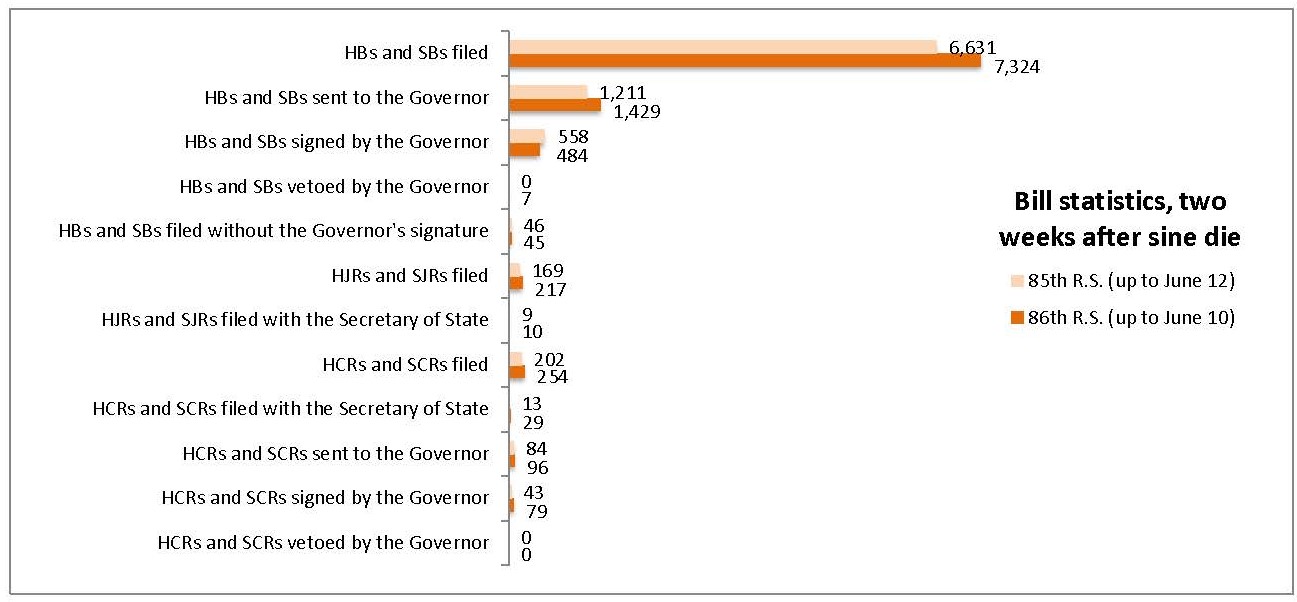
|
House and Senate Bills
|
|
| Filed | 7,324 |
| Sent to the Governor | 1,429 |
| Signed by the Governor | 484 |
| Vetoed by the Governor | 7 |
| Filed without the Governor's signature | 45 |
| House and Senate Joint Resolutions | |
| Filed | 217 |
| Filed with the Secretary of State | 10 |
| House and Senate Concurrent Resolutions | |
| Filed | 254 |
| Filed with the Secretary of State | 29 |
| Sent to the Governor | 96 |
| Signed by the Governor | 79 |
| Vetoed by the Governor | 0 |
|
House and Senate Bills
|
|
| Filed | 7,324 |
| Sent to the Governor | 1,053 |
| Signed by the Governor | 222 |
| Vetoed by the Governor | 6 |
| Filed without the Governor's signature | 21 |
| House and Senate Joint Resolutions | |
| Filed | 217 |
| Filed with the Secretary of State | 6 |
| House and Senate Concurrent Resolutions | |
| Filed | 254 |
| Filed with the Secretary of State | 15 |
| Sent to the Governor | 86 |
| Signed by the Governor | 71 |
| Vetoed by the Governor | 0 |
The 86th Regular Session ends Monday, May 27. As the end of session nears, many House and Senate members have been appointed to conference committees to resolve differences between their versions of bills. For information on the conference committee process, please see The Legislative Process in Texas.
To see a list of bills for which a conference committee was requested, please click here. Upon receiving completed conference committee reports, the LRL scans and posts them in our conference committee reports database. These reports, as well as a list of the members of a bill's conference committee, also are listed in the Texas Legislature Online record for each bill.
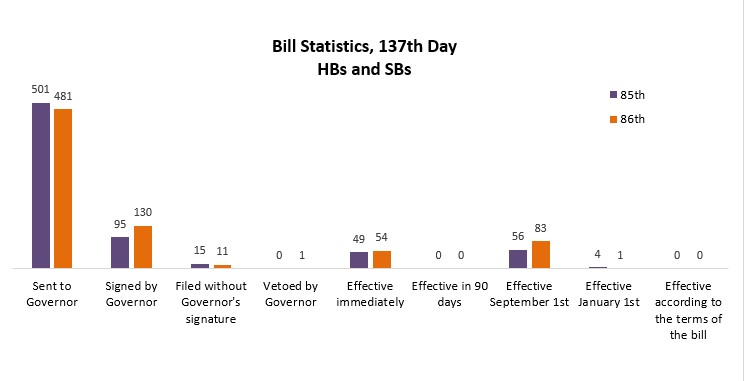
Bill Statistics, 133rd Day
May 21
Bill statistics comparing the 133rd day of the 86th and the 85th Regular Sessions are below. For information about what happens to a bill after it passes, please see our Legislative FAQ page. To learn more about the legislative process and see bill statistics for earlier points in the 86th Regular Session, check out some of our recent blog posts.
